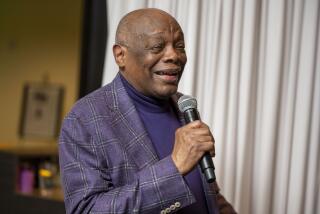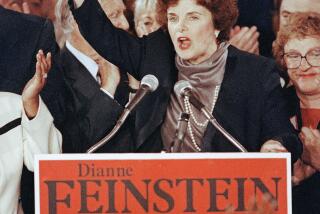How I Made It: California Fashion Assn. president Ilse Metchek
The gig: Ilse Metchek is president of the California Fashion Assn., which puts her in the perfect spot to be the connector and self-described “class historian” for the Southland’s fashion and retail industry. Metchek oversees a roster of more than 400 members involved in the state’s apparel and textile business, including manufacturers, designers, lawyers and accountants. Some days, she does research or tries to influence politicians on issues that affect the industry, such as a higher minimum wage. Other days, she gives international delegations an overview of the region’s retail industry. She also brings together people and businesses that can help each other.
The right fit: Metchek was born Ilse Hirsch in Frankfurt, Germany, and immigrated to the U.S. as a baby when her parents fled Hitler’s rise to power. Growing up in a German enclave in Brooklyn, Metchek said, she was “a chubby kid with thin ankles” who had no interest in fashion. But at age 16, a friend got part-time work as a fit model, used by designers to check the sizing and look of garments. The job sounded so fun that Metchek spent a year slimming from size 14 to size 8 to find similar work. “I loved it because I was in fashion … and saw a lot of interesting types,” she said. “It really broadened my view on the world.” She ended up attending New York University’s School of Retailing. Upon graduating, she got a full-time job as an assistant advertising manager at a textile company; her salary was $75 a week.
California bound: While in college, she fell for a young man who convinced her to go on a date after whistling at her in New York’s Garment District. She married Mitch Metchek, then the two returned all their wedding presents and used the cash to travel around Mexico for three months. The pair eventually ran out of money; a family friend picked them up in Tijuana and drove them to California. “We were hippies,” she said. The Metcheks both found work in the city’s garment industry. Ilse Metchek quit a few years later to stay at home with their three daughters, and then started taking pattern-making classes. “I was bored,” she said. “I had watched designers do it and said, ‘OK, I can do that.’”
Extensive alteration: Always ambitious, Metchek decided to get a job after her girls started school, even though none of her friends with kids worked. Her first job was designing square-dancing outfits. Metchek said she was “terrible” in the role. “A Brooklyn girl doing square dancing — I had never seen rickrack in my life,” she said. “I was trying to make it chic, but black does not work in square dancing.” She got along well with her bosses, though, who hooked her up with her next job, as a sportswear designer at the clothing company Catalina. She was its only Jewish employee at an executive level. “They said to me, I was one of the ‘good ones,’” she recalled. In those days, “You did not sue. If somebody patted you on the [rear], you just smiled and walked away.”
Sewing forward: Metchek landed next at Anjac, the clothing manufacturing company co-founded by Los Angeles business heavyweight Jack Needleman. She stayed for 17 years, working her way up from designer to president of the company. After Mitch died in 1983 from cancer, Metchek made up her mind to buy Anjac using $250,000 of her husband’s life insurance money. She wanted to control her own destiny. “I wasn’t going to coast, and I wasn’t going to wait for another man to come along,” she said. “I had to do something.”
Zigging and zagging: In the 1980s Metchek said the designs her company was producing were becoming outdated as female shoppers started favoring more contemporary fashions. So in 1991, she shut down the company and moved to Warnaco, a company now best known for underwear. A few hops later brought her to an executive position at the California Market Center, home of wholesale showrooms and Los Angeles designers.
A new pattern: In 1995, authorities found dozens of undocumented garment workers in El Monte toiling in slave-like conditions surrounded by razor wire. The scandal shook the region’s retail industry, and prompted L.A. Mayor Richard Riordan to call a meeting of stakeholders to discuss creating an organization that united fashion companies on pressing issues such as labor conditions. “They all looked at me and said, ‘She’ll do it,’” Metchek said. The California Fashion Assn. occasionally has received funding from the city for special projects, but mostly operates through membership dues. Metchek now has two employees.
Tailored advice: Metchek has two pieces of advice for those aspiring to get into the fashion business: Get a deep foundation of experience and skills, and don’t burn any bridges. Many people are enthusiastic about style, but have no interest in learning about accounting, financing and real estate — all crucial to running a successful company, Metchek said. If you don’t have the right skills, find a business partner who does, she said. Metchek recommends staying on good terms with former colleagues, who can be key to helping you find work, especially in an industry that doesn’t place as much emphasis on college degrees and grade point averages.
A rich tapestry: Metchek’s second husband, textile executive Hans “Hank” Pola, died last year. A scholarship was established in his name for students at the Fashion Institute of Design & Merchandising in downtown Los Angeles. Metchek’s daughter Tracy died this year. Metchek’s family now includes two daughters, one stepdaughter and six grandsons. In her spare time, Metchek prefers to go salsa dancing rather than do anything remotely resembling sewing or fashion. (She called going shopping a “busman’s holiday.”)
Twitter: @ByShanLi







